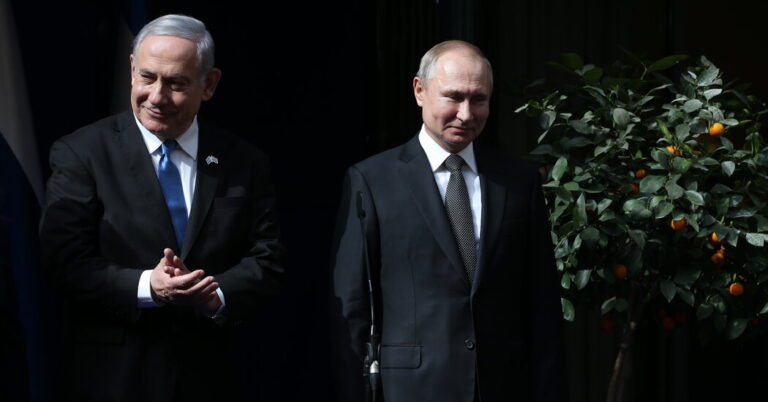Israel, though heavily dependent on support from the United States, Germany and other Western nations, has been noticeably out of step with them when it comes to relations with Russia during its war of conquest in Ukraine.
Long before Hamas attacked Israel from Gaza on Oct. 7, the country refused Ukrainian requests to send arms or to apply widespread sanctions on Russia, including stopping flights to the country. Despite the eagerness of President Volodymyr Zelensky of Ukraine, himself Jewish, to visit the country and show solidarity after the attack, he has never made the trip.
The reasons reflect Israel’s unique security needs and Prime Minister Benjamin Netanyahu’s delicate relationship with President Vladimir V. Putin of Russia, a primary supporter of Israel’s enemies in the region whom Israel cannot afford to offend.
As Israel’s war with Hamas enters its sixth month, Mr. Netanyahu needs Mr. Putin’s good will to help constrain Iran in particular and to continue to strike Iranian targets in Syria while trying to avoid harming the forces Russia maintains there.
So Mr. Netanyahu has consistently given the Russian leader wide latitude, even at the risk of alienating Israel’s main allies in Europe and the United States.
“Israel is playing on a delicate tightrope,” said Emmanuel Navon, the Israel-based executive director of ELNET Israel, a nongovernmental organization that seeks to strengthen diplomatic ties between Israel and Europe.
But even as Israel treads lightly when it comes to Russia, the relationship remains vastly lopsided. Mr. Putin has been a vocal critic of Israel, using condemnation of Israel’s war in Gaza to appeal to the Global South, a term for an informal group of developing and underdeveloped countries, some of whom have been critical of the United States, Europe and the current world order.
After Hamas’s Oct. 7 attack, which Israeli authorities say killed about 1,200 people, most of them civilians, Mr. Putin said nothing for three days. Then, without expressing condolences for Israel or the victims, the Russian leader criticized the United States, calling Oct. 7 “a clear example of the failure of United States policy in the Middle East.”
Ever since, Russia has been vocal in condemning Israel’s war against Hamas, which has killed more than 31,000, including combatants, but a majority of the total are women and children, according to Gazan health authorities.
“When Oct. 7 rolled around, Putin found a ready-made issue, not to break relations with Israel, but to begin distancing” Russia from Israel, said Aaron David Miller, a former American diplomat at the Carnegie Endowment for International Peace.
At the United Nations, Russia has questioned Israel’s right to self-defense and repeatedly called for a humanitarian cease-fire to halt Israel’s military campaign. Russia has also amplified pro-Hamas views online.
Russian officials have expressed sympathy or support for South Africa’s charge at the International Court of Justice that Israel is committing genocide, which Israel denies.
At the same time, Russia has also used the war in Gaza to defend its own war in Ukraine. The West, it argues, has been hypocritical to condemn Russia’s attacks on civilians in Ukraine while supporting what it considers to be similar Israeli attacks on civilians in Gaza.
In late October, Russia hosted a Hamas delegation in Moscow, which the Israeli foreign ministry called “reprehensible.” In late February, Russia hosted another Hamas delegation for a meeting of Palestinians in Moscow.
After a December call between Mr. Netanyahu and Mr. Putin, which Mr. Miller of Carnegie said reflected the tension between the two nations, Mr. Netanyahu said he had criticized Russia for supporting Iran, while Mr. Putin said he had criticized Israel for the humanitarian crisis in Gaza.
In the past, Mr. Netanyahu had boasted of his excellent relationship with Mr. Putin and his self-described ability to deal with great powers. Now “that relationship is more of a liability than an advantage,” Mr. Miller said.
Just last Friday, the Russian ambassador to Tel Aviv, Anatoly Viktorov, was called to the Israeli Foreign Office to protest remarks by Russian officials at the United Nations casting doubt on a U.N. report supporting findings of sexual violence by Hamas. In early February, Russia summoned the Israeli ambassador to Moscow, Simona Halperin, over “unacceptable remarks” that they said distorted Russia’s foreign policy.
The deepening connection between Russia and Iran during the Ukraine war has also raised concerns for Israeli and American officials. Tehran has provided Moscow with drones, missiles and other weaponry.
Arkady Mil-Man, a former Israeli ambassador to Russia now at the Institute for National Security Studies at Tel Aviv University, said that Mr. Netanyahu appeared to ignore that “Israel is perceived as an enemy by the Russians.”
The relationship between Israel and Russia would only worsen, he said, because “the Russians chose a clearly anti-Israeli side.”
But Israel can hardly afford a break in relations.
A significant number of Israeli citizens emigrated from the former Soviet Union and made their lives in Israel. But Israel still has a stake in looking out for the Jewish population that remains in Russia. In late October, a mob stormed a Russian airport to search for Jews on an incoming flight from Israel.
“We want to maintain the door open,” said Sarah Fainberg, the director of Tel Aviv University’s research program on Russia and China’s role in the Middle East. It was important that the Jewish Agency, a nonprofit that helps Jews immigrate to Israel, remained operational in Russia, she said: “We want to be able to rescue this population in times of emergency.”
While antisemitism isn’t new in Russia, Ms. Fainberg said, Mr. Putin’s new antagonism toward Israel has raised concerns. “Formerly, we thought there was an antisemitic Russia but a pro-Jewish president,” she said. “Now things have changed.”

